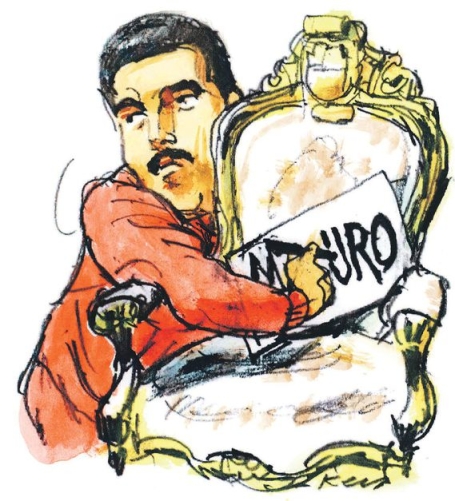Despite all of the problems at Ultimas Noticias, the reporters there keep turning out some of the best investigative pieces in Venezuela. This time, it was the turn of Lisseth Boon in her excellent piece about Helados Coppelia, which can also be entitled Chávez frozen Cuban dream.
To put it in perspective, Chávez was such a Cubanologist that despite the long tradition of ice cream in Venezuela (Tio Rico, Efe, Castellino, Crema Paraiso, 4D, Versalles), rather than promote local brands, Chávez did the opposite, trying to promote and bring to Venezuela the Coppelia brand, his hero’s Fidel Castro’s creation. Castro created Coppelia in 1966, much like Chávez, it was his idea, nothing was done in Cuba that was not Fidel’s idea. Well, Efe and Tio Rico and Castellino (which made killer frozen lemonade) were around in Venezuela well before then. I can prove that Efe was here before 1966, in the only picture you will ever see of The Devil in this blog, here is the Devil eating Efe ice cream circa 1951 or 1952 (Vanilla, of course!):
Yes! I am proud of my ice cream heritage and taste!
Chavez was not…
Instead, Hugo went to Cuba and brought the Copellia brand to Venezuela. In 2012 Chávez inaugurated the Copellia plant and called them “the best in the world”, which clearly showed he was not much of an ice cream eater.
And because every project in Venezuela since 1999, was Chávez’ project, despite his keen interest in it, Coppelia, much like the rest of the projects, did not work out well. In fact, barely three weeks after the inauguration, the plant was closed. Somebody told Chávez something was wrong, he even suggests that Fidel called to complain. Then, on nationwide TV Chávez complained to everyone:
and the then Minister of “Efficiency” (today Minister of Defense, clearly a justified promotion) Carmen Melendez, told Chávez then, that the plant was closed because a machine broke down, there were not enough supplies and they did not have a sufficient number of containers to put the ice cream in.
Chavista planning at its best! We are talking only three weeks.
Long term in their attention span.
Well, as Ms. Boon reports in Ultimas Noticias (kudos to her!), things have not really improved much. There is only one Coppelia ice cream parlor (Gradillas a San Jacinto) in Caracas and some 72 spots where you can supposedly buy the stuff.
Except sometimes you can’t
Compare that with thousands of places you can buy Efe or Tio Rico or Crema Paraiso and I know at least five 4D ice cream parlors, with even one in Miami Beach.
But much like anything else, Chávez preferred to promoted foreign ideological stuff, even if it was ice cream, than successful Venezuelan ones and enterprises.
Chávez initially promised that Coppelia ice cream would be made with Venezuelan products and supplies. Milk products from Lacteos Los Andes (now practically bankrupt), sugar from CVA Azucar (now shut down, see first post) and orange, guava, mango, peach and coconut.
Well, 18 months later and now Chávez is dead, Coppelia produces ice cream, mostly creamy flavors, in irregular and limited fashion. Raw materials and supplies are all imported. Forget about all those fruit flavors, but its manager says raw materials come from Lacteos Los Andes, which is practically shut down.
Go figure!
But, a different raw material, money, is not in short supply for Coppelia. In March the plant received an additional Bs. 12.1 million in Venezuela. This adds to the funding in 2012 and to the US$ 4 million given to the Cuban Coppelia in 2013 to “increase its production”
But, in 2013, the milk came from Nicaragua, while powdered milk was imported in 2013 to the tune of 187 thousand Tons. But ask the manager, and it is all Venezuelan. As for the fruit juices, the same manager of the plant said almost a year ago that “in a few weeks fruit flavors will be on the street”
But we are still waiting.
So, much like the Bolivarian revolution, Chávez’ frozen Cuban dream is just that, an ill-conceived dream, a Presidential and Bolivarian whim, with little to show for it.
I wonder who the Minister for Efficiency is today? Just asking…
Next: Tales Of Bolivarian Inefficiency IV: Puerto Cabello’s Bermuda-like Triangle









